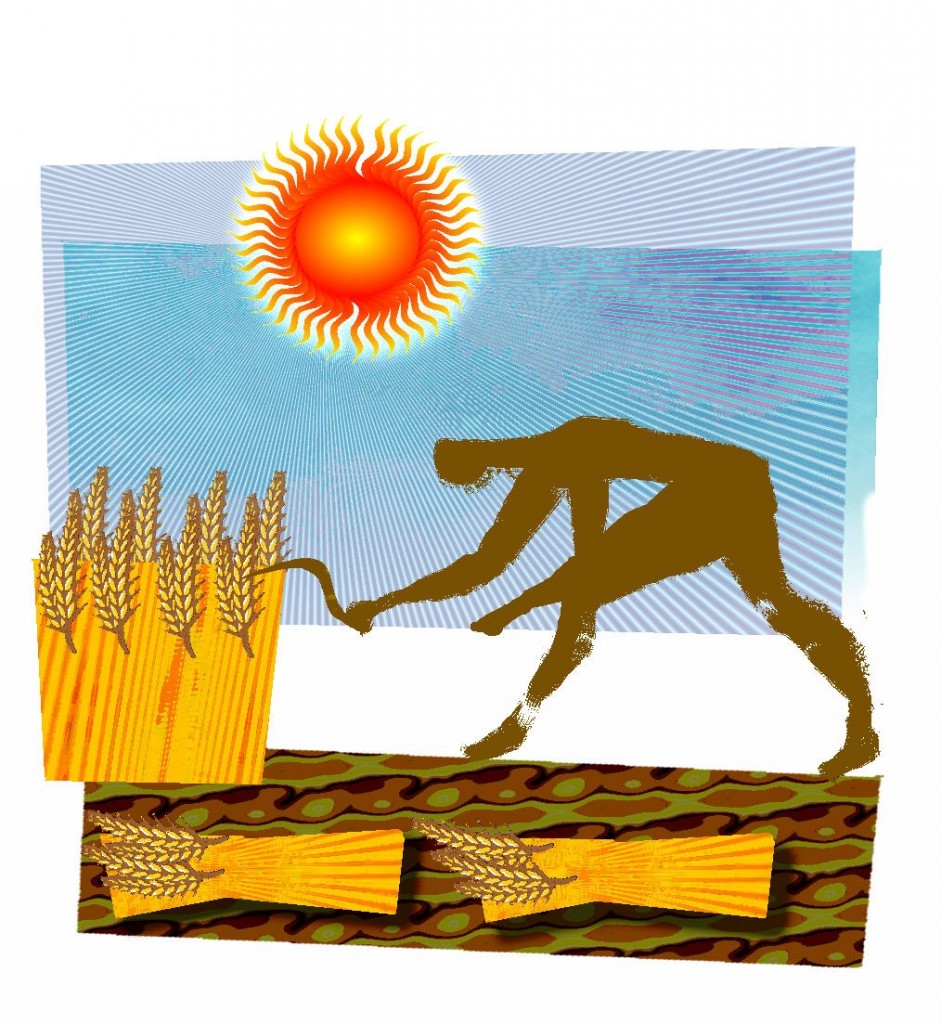Matthew 18:21-22
How many of you have found yourself weeping this week?
How many of you have found yourself turning off your televisions and radios, turning past stories in the newspaper, skipping the Facebook comments …
… because you just can’t go there again?
Ten years after the horrible tragedies of 9/11, many of us, myself included, are still filled with grief.
We have moved on from the immediate shock, from the numbness, from the piercing pain that came with the attacks.
But we are still filled with grief.
• • •
This morning’s Gospel lesson from Matthew – chosen years and years and years ago, long before September 11, 2001 – is about forgiveness. In it we hear the story of Peter – poor, befuddled Peter, who never quite gets it but never stops trying – asking Jesus how many times he has to forgive.
“As many as seven times?” he asks, knowing that seven times’ worth of forgiveness would be wildly extravagant.
No, Jesus replies. “Not seven times, but, I tell you, seventy-seven times.”
This is, I tell you, a lesson in extravagance, in the extravagant, wild, radical, never-ending love of God that Jesus proclaims in his preaching, in his teaching, in his healing, and in the end, with his own life.
We are, Jesus says, to forgive extravagantly. More than we want. More than we can imagine.
And yet, on this morning, on this tenth anniversary of terror and murder, that kind of forgiveness seems … well, it almost seems out of our reach.
It almost seems as if God is asking us to do something far greater, far grander than we can possibly imagine, much less accomplish.
And yet … it is what God is asking of us.
Forgive.
More than you want.
More than you can imagine.
I don’t know about you, but I need to admit something, I need to put something out on the table:
I am not certain I know how to do this.
I am not certain I can forgive as extravagantly as Jesus asks.
And I think that is why I am still weeping, 10 years after the fact.
Like you, I remember that day.
I remember hearing the plane fly over my parish in Annandale and saying to the secretary, “Wow, that guy is way off course.”
I remember hearing the plane hit the Pentagon and saying to her, “Man, that guy just dropped a load,” because I thought it was a construction accident.
I remember returning hours later to my apartment, less than a mile from the Pentagon, and finding it filled with dust and ashes … because I had left the windows open – it was such a beautiful day, wasn’t it?
I remember being unable to keep my apartment clean or to sleep soundly for weeks afterwards, because the trucks carrying the debris – the dust and the ashes – drove by my place, day after day, night after night, constantly spreading more dust, more ash, constantly rumbling along.
Like you, I remember the military jets that flew overhead night and day, watching as they left lazy contrails in their wake.
I remember the fear … the grief … the loss …
I remember …
And because I remember … so vividly … so profoundly … I think I cannot fully forgive.
Not as Jesus asks.
Not seventy-seven times.
Not yet.
• • •
And yet …
I want to forgive.
Really, I do.
I want to forgive because it is what Jesus taught us to do. It is what we pray for when we pray in the very words that Jesus gave us: Forgive us our sins as we forgive those who sin against us.
I want to forgive, because I think if I don’t, my very soul may be in danger.
But I’m not certain I’m there yet.
Which is why, especially this past week, I have cried.
• • •
You know what is that I cannot forgive?
It’s not the hijackers, Mohammed Atta and those 18 others who turned airplanes into missiles.
And it’s not Osama bin Laden and all who have followed his misbegotten ideas of faith.
No, what I cannot forgive is the hatred that fueled those men to do commit these atrocities.
What I cannot forgive is anyone bastardizing the love of God for all of God’s beloved children.
And what I cannot forgive is the suffering that these men caused, all so they could – they thought – have their own way.
I agree with Anne Morrow Lindbergh, who wrote, in 1955:
“I do not believe that sheer suffering teaches. If suffering alone taught, all the world would be wise, since everyone suffers. To suffering must be added mourning, understanding, patience, love, openness, and a willingness to remain vulnerable.”[1]
The hatred they rained upon us, the deliberate misinterpretation of God’s will, the suffering they caused … for what? I ask you … those are the stumbling blocks on my path to forgiveness.
From conversations I have had with others, from news stories I have read and the very few news shows I have watched or listened to, I think I am not alone in this pain.
And so I think that perhaps now, on this day, the tenth anniversary of that awful day, which we cannot escape no matter how hard we try, I think that perhaps today is a day to … let go.
A day to … set my feelings free.
A day … for release.
For that is what the word forgive means, in the Greek. It means release. To let go. To set free.
Because only by releasing, by letting go, by setting free, do we have a chance … a chance … not of moving on, but of moving forward.
Author and priest Barbara Brown Taylor, writing in 1998 – again, years before 9/11, proclaimed:
When you allow your enemy to stop being your enemy, all the rules change. Nobody knows how to act anymore, because forgiveness is an act of transformation. It does not offer the adrenaline rush of anger, nor the feeling of power that comes from a well-established resentment. It is a quiet revolution, as easy to miss as a fist uncurling to become an open hand, but it changes people in ways anger only wishes it could.[2]
I want fists to uncurl today. Not just my fist, but all fists. I want our hands to be open … to the possibility of transformation … to the possibility of peace … to the possibility of love.
The Rev. David F. Sellery, a priest in Bay Shore, N.Y., wrote about forgiveness in a reflection for today:
Forgiveness, he says, “is the essence of Christian love. … It is not a largesse we dispense by power of our innate superiority [but rather] the grace of God transmitted through us. It is,” he says, “the ultimate witness of Christ’s love in the world.”[3]
Sellery knows that the pain of 9/11 remains. And he is clear that forgiveness is not a “get-out-of-jail-free card for perpetrators.” God, he says, “has not issued an easy-pass for evil in the world to benefit the bad guys.”[4] There is to be justice – as long as it is not revenge.
Sellery concludes: “The choice is ours. We can live in love or we can live in hate. Both are transformative forces. We can become what we value and love or we can risk becoming the evil we obsess upon.”[5]
Forgiveness, it seems, really is about opening our fists to the possibilities of new life.
Writing in The Washington Post last Tuesday, Lynne Steuerle Schofield, whose mother, Norma Lange Steuerle, died on American Flight 77 when it flew into the Pentagon, suggested the same kind of transformation, the same willingness to open our fists to release. She said that with every anniversary, it is as though she is being asked to go to her mother’s funeral over and over and over again. Instead, she wrote:
What if we all spent the 11th anniversary of the attacks (she is speaking of next year) reflecting on what we admired most about our lost loved ones and trying to emulate those ideals? Or what if we spent time building not another structure in memorial but, instead, building our relationships with others? Or raising money for our favorite charity?[6]
If we want the world to be more compassionate, safer and more equitable, she writes, we have to work to make that happen. We all have to be on board. We should reflect on the characteristics of our loves ones that we want to keep alive, and then we must behave that way.[7]
Our Gospel today, my friends, teaches us about forgiveness. It teaches us about extravagant forgiveness, which can only come from extravagant love.
Not our love.
For our love is, sadly to say, far too often far too small.
But God’s forgiveness?
God’s forgiveness is extravagant. It is overwhelming.
Because it comes from God’s extravagant love.
And it is what God is calling us to.
I may not be there … yet.
But if I can’t forgive extravagantly, perhaps I can love … just a little bit more extravagantly. Perhaps I can, as Presiding Bishop Katharine Jefferts Schori says, be “more inclined toward peace,” at least a little bit more extravagantly.
Perhaps I can relax my hand on the pain that still grips me – and in that moment, release the pain as I reach out to others still in pain, still in mourning.
I think that this morning, I am more like Peter than I realize: I haven’t quite gotten it yet, I still can’t quite go to where Jesus wants me, but I am still trying to understand. Still trying to be extravagant with my forgiveness, my release, my love.
My prayer for us this morning … for those of us here, for the Church as a whole, for this nation and for the world … is that we relax our hands, opening them as much as we can. My prayer is that we focus on the extravagance of God’s love for us, and in the releasing of our pain and sorrow, we set that love free for the whole world to see and know and hear and feel.
We do not have to forget.
We cannot forget.
But perhaps … just perhaps … with the help of our Lord, we can forgive.
Amen.
Sermon preached for the Service of Remembrance on the 10th Anniversary of 9/11, at St. Gabriel’s Episcopal Church, Leesburg, Va., Sept. 11, 2011. (Proper 19, Year A)
[1] Anne Morrow Lindbergh, Gift from the Sea, 1955.
[2] Barbara Brown Taylor, Christianity Today, Feb. 9, 1998.
[3]The Rev. David F. Sellery is rector of St. Peter’s By-the-Sea Church and Day School in Bay Shore, New York. http://www.episcopalchurch.org/80050_129713_ENG_HTM.htm
[4] Ibid.
[5] Ibid.
[6] Lynne Steuerle Schofield, “A 9/11 event that embraces the future,” The Washington Post, Sept. 6, 2011, http://www.washingtonpost.com/opinions/a-911-event-that-embraces-the-future/2011/09/01/gIQAm6np7J_story.html?fb_ref=NetworkNews&fb_source=profile_multiline.
[7] Ibid.







